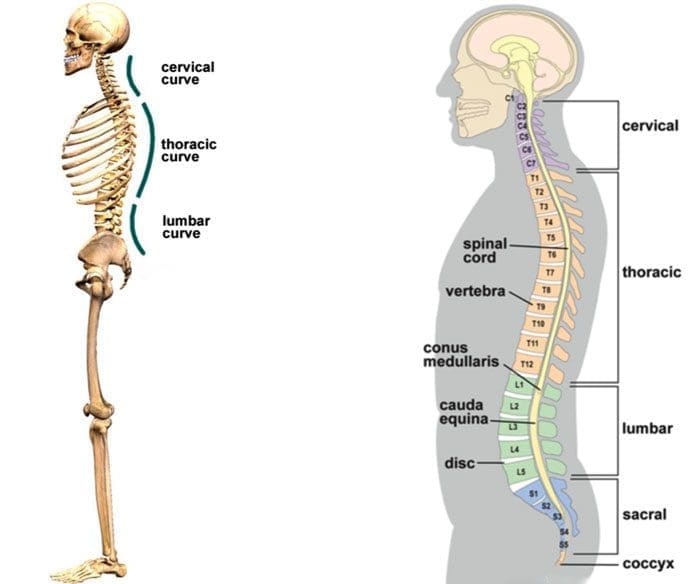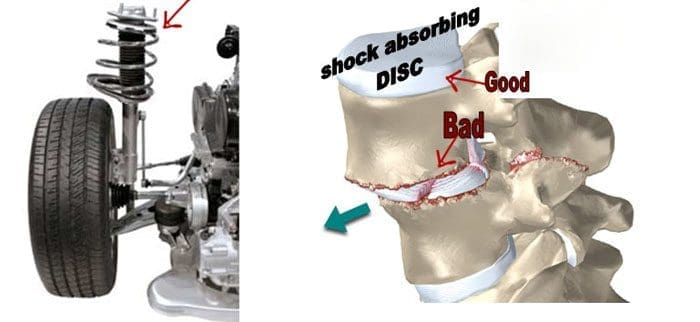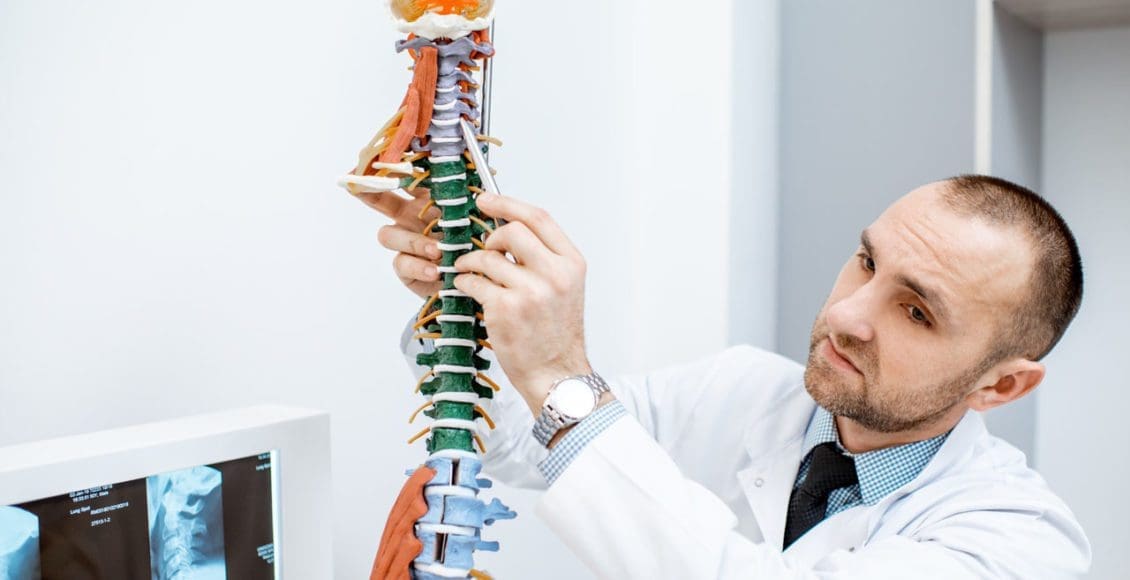Individuals believe that a straight spine is a healthy spine. This is a misconception; a chiropractor knows that a healthy spine has the proper curvature, specifically an S curve from the top to the bottom. This curve allows/enables the spine to properly function for balancing and stabilizing the body. Three primary curves make up the S shape. These are:
- Cervical lordosis – Neck curvature
- Thoracic kyphosis – Middle back curvature
- Lumbar lordosis – Lower back curvature
Lordosis is defined as an inward curve, while kyphosis is an outward curve. 
Table of Contents
Curvature Significance
When the spine is properly curved and aligned, the body has flexibility and optimal support. The curves of each section/area create a spring structure that enables the spine to perform as a natural shock-absorber. If the spine was straight, it would take a significant toll with all the wear and tear from constant vibration and shock. This would lead to fractures and other injuries. The curvature is important in aiding weight distribution and gravity weight. Each curve distributes weight evenly throughout the spine so that the different muscle groups do not get overworked. This happens during dynamic movement.
- Lifting
- Bending
- Reaching
- Twisting
- Turning
- All require the spine to move harmoniously with the rest of the body, supporting the body’s weight and energy transfer.
The curves help reduce pressure between the individual vertebral discs. Because the discs are not stacked on top of each other, the weight from the above vertebra is not completely placed on the one below. So the lower vertebra takes only a portion of the weight, allowing the discs to perform as an absorbing cushion.

Maintaining The Curvature
An adult spine gradually becomes an S curve and is formed through development. Children are born with a C curve, with an outward curve until they begin to crawl. When the child raises their heads up, the cervical portion of the proper S shape begins to form. As the child learns to walk upright, the spine continues in its ultimate support role. However, because spinal curvature is formed in the developmental stages, natural curvature formation has a limited time frame. Issues that happen at this time can disrupt the proper formation of the curves. This can result in malformations that could require long-term chiropractic treatment/rehabilitation to correct.
For adults that develop a normal S curve, spinal maintenance is critical. When subluxations/misalignments occur, bulging, herniated discs, pinched nerves, and sciatica are sure to follow. Chiropractic adjustments will ensure the spine is reset and properly supported. As natural spinal development has passed, maintenance is essential. Chiropractic treatment uses precision tools and techniques to heal the spine returning to the natural S curve. Treatment plans and adjustments are customized to the individual and applied specifically to their unique spinal shape. This makes it possible to maintain a spine with precise curvature.
Body Composition
Fruit and Plant Antioxidants
Regularly including antioxidant-rich foods in an individual’s diet will help reduce free radicals and prevent oxidative stress from accumulating. Fruits and veggies like:
- Berries
- Dark-colored grapes
- Spinach
- Kale
- Sweet potatoes
- Carrots
- All are great sources of antioxidants.
Purple-colored fruits like blueberries and dark grapes contain an antioxidant called resveratrol that has therapeutic properties for heart disease. Beta-carotene is an orange-colored carotenoid with antioxidant properties that can protect against heart disease. Orange, yellow-colored plant foods, and leafy greens are solid sources of the antioxidant carotenoid beta-carotene or pro-vitamin A. Minerals like zinc and selenium have antioxidants that can be found in vegan sources. And minerals in fruits and veggies contain blood pressure-lowering potassium, magnesium, and calcium.
References
Yang, Feng, et al. “Balance chiropractic therapy for cervical spondylotic radiculopathy: study protocol for a randomized controlled trial.” Trials vol. 17,1 513. 22 Oct. 2016, doi:10.1186/s13063-016-1644-2
Taylor, J A. “Full-spine radiography: a review.” Journal of manipulative and physiological therapeutics vol. 16,7 (1993): 460-74.
Fedorchuk, Curtis, et al. “Improvements in Cervical Spinal Canal Diameter and Neck Disability Following Correction of Cervical Lordosis and Cervical Spondylolistheses Using Chiropractic BioPhysics Technique: A Case Series.” Journal of radiology case reports vol. 14,4 21-37. 30 Apr. 2020, doi:10.3941/jrcr.v14i4.3890
Post Disclaimer
Professional Scope of Practice *
The information on this blog site is not intended to replace a one-on-one relationship with a qualified healthcare professional or licensed physician and is not medical advice. We encourage you to make healthcare decisions based on your research and partnership with a qualified healthcare professional.
Blog Information & Scope Discussions
Welcome to El Paso's Premier Wellness and Injury Care Clinic & Wellness Blog, where Dr. Alex Jimenez, DC, FNP-C, a board-certified Family Practice Nurse Practitioner (FNP-BC) and Chiropractor (DC), presents insights on how our team is dedicated to holistic healing and personalized care. Our practice aligns with evidence-based treatment protocols inspired by integrative medicine principles, similar to those found on this site and our family practice-based chiromed.com site, focusing on restoring health naturally for patients of all ages.
Our areas of chiropractic practice include Wellness & Nutrition, Chronic Pain, Personal Injury, Auto Accident Care, Work Injuries, Back Injury, Low Back Pain, Neck Pain, Migraine Headaches, Sports Injuries, Severe Sciatica, Scoliosis, Complex Herniated Discs, Fibromyalgia, Chronic Pain, Complex Injuries, Stress Management, Functional Medicine Treatments, and in-scope care protocols.
Our information scope is limited to chiropractic, musculoskeletal, physical medicine, wellness, contributing etiological viscerosomatic disturbances within clinical presentations, associated somato-visceral reflex clinical dynamics, subluxation complexes, sensitive health issues, and functional medicine articles, topics, and discussions.
We provide and present clinical collaboration with specialists from various disciplines. Each specialist is governed by their professional scope of practice and their jurisdiction of licensure. We use functional health & wellness protocols to treat and support care for the injuries or disorders of the musculoskeletal system.
Our videos, posts, topics, subjects, and insights cover clinical matters and issues that relate to and directly or indirectly support our clinical scope of practice.*
Our office has made a reasonable effort to provide supportive citations and has identified relevant research studies that support our posts. We provide copies of supporting research studies available to regulatory boards and the public upon request.
We understand that we cover matters that require an additional explanation of how they may assist in a particular care plan or treatment protocol; therefore, to discuss the subject matter above further, please feel free to ask Dr. Alex Jimenez, DC, APRN, FNP-BC, or contact us at 915-850-0900.
We are here to help you and your family.
Blessings
Dr. Alex Jimenez DC, MSACP, APRN, FNP-BC*, CCST, IFMCP, CFMP, ATN
email: coach@elpasofunctionalmedicine.com
Licensed as a Doctor of Chiropractic (DC) in Texas & New Mexico*
Texas DC License # TX5807
New Mexico DC License # NM-DC2182
Licensed as a Registered Nurse (RN*) in Texas & Multistate
Texas RN License # 1191402
ANCC FNP-BC: Board Certified Nurse Practitioner*
Compact Status: Multi-State License: Authorized to Practice in 40 States*
Graduate with Honors: ICHS: MSN-FNP (Family Nurse Practitioner Program)
Degree Granted. Master's in Family Practice MSN Diploma (Cum Laude)
Dr. Alex Jimenez, DC, APRN, FNP-BC*, CFMP, IFMCP, ATN, CCST
My Digital Business Card


